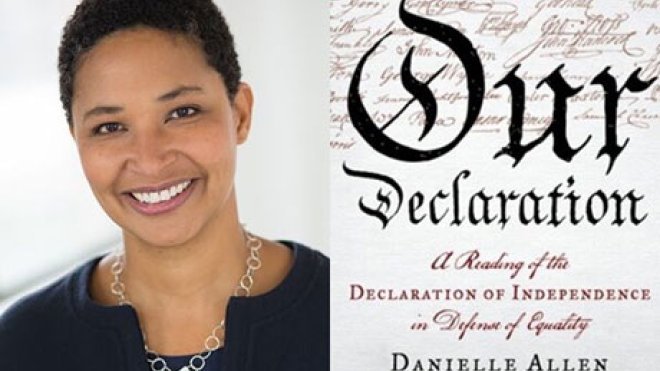An Argument for Freedom and Equality: Examining the Declaration of Independence
As author of the Common Reading 2019 book, political theorist Danielle Allen to share insights into her philosophical examination of the historic document on Oct. 15

BRISTOL, R.I. – What does the Declaration of Independence mean when it professes equality and the rights to “life, liberty and the pursuit of happiness” for all?
Many scholars have explored the Founding Fathers’ prose, but none have trained such scrutiny over each line, and sometimes each word, as Danielle Allen. As part of this year’s Common Reading program, Allen – an acclaimed writer and political theorist – will share her philosophical examination of America’s guiding document and the argument outlined within for freedom and equality for all of its citizens.
On Tuesday, Oct. 15, the campus community is invited to spend an evening with Allen, whose work, Our Declaration: A Reading of the Declaration of Independence in Defense of Equality, challenges us to think beyond the Declaration of Independence as a moment in history and to reclaim its ideals as belonging to every American. Allen’s book is this year’s selection for the RWU Common Reading program, which brings together the campus community to read and share discourse on a selected work.
“Danielle Allen provides a well-researched explanation of why a close reading of the Declaration of Independence matters for our understanding of the relationship between liberty and equality,” RWU Vice Provost Robert Shea said. “At RWU, we teach our students to conduct sophisticated, scholarly readings that hone their critical thinking and analytical skills, preparing them to become deeply engaged citizens that interact with society in mutually beneficial ways.”
A Washington Post review praised Our Declaration as “a primer on all that we have been missing” from our knowledge of America’s founding document: “This book sets out to debunk the notion that freedom alone is the supreme virtue arising from the declaration. In doing so, it restores equality to the level of importance it once shared with freedom as equal partners in the revolution that gave birth to a nation. And Allen does not fail to address the limits of what equality meant to these founding white-skinned, land-owning fathers.”
Allen is the James Bryant Conant University Professor at Harvard University, director of Harvard’s Edmond J. Safra Center for Ethics, and the principal investigator for Harvard’s Democratic Knowledge Project. Widely known for her work on justice and citizenship in both ancient Athens and modern America, Allen is also the author of The World of Prometheus: The Politics of Punishing in Democratic Athens (2000), Talking to Strangers: Anxieties of Citizenship since Brown vs. the Board of Education (2004), Why Plato Wrote (2010), Education and Equality (2016), and Cuz: The Life and Times of Michael A. (2017). She is the co-editor of the award-winning Education, Justice, and Democracy (2013, with Rob Reich) and From Voice to Influence: Understanding Citizenship in the Digital Age (2015, with Jennifer Light). She is a Chair of the Mellon Foundation Board, past Chair of the Pulitzer Prize Board, and a member of the American Academy of Arts and Sciences and the American Philosophical Society.
Allen’s Oct. 15 presentation will take place at RWU’s Bristol campus in the Campus Recreation Center Fieldhouse at 7 p.m. A book signing will immediately follow. Attendance is required for all first-year students and open to the entire RWU community, with limited seats available to the greater community. Depending on attendance, some attendees may be seated in an overflow location.